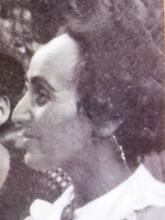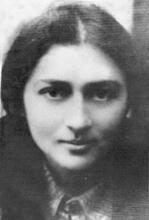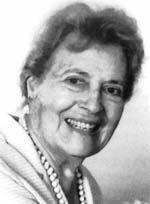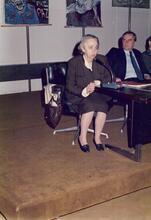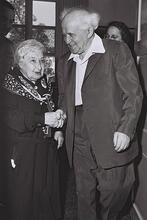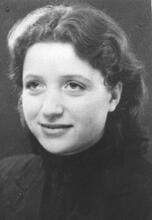Yudica
Born in Lithuania in 1896, Yudica (the pseudonym of Yehudit Zik) experienced a violent childhood featuring war and impoverishment. During World War I, she was incarcerated as a prisoner of war for a year until her escape. After the war, she became a governess in Kharkov, Ukraine, where soon her poetry, essays, and fiction began to appear regularly in journals across Poland, Lithuania, and Russia. In 1929, Yudica arrived in Canada, where she became a leader of the proletarian Yiddish writers in Canada. Her work was most widely featured in leftist newspapers and journals, such as Der Kampf, Yidishe Kultur, Zukunft, and the Di Morgen Freiheit. She also appeared in many anthologies and collections, including H. M. Caiserman’s Yiddishe dichter in Kanade and N. Mayzel’s famous Amerike in yidishn vort.
Early Life in Europe
Yudica was the pseudonym of Yehudit Zik, a poet whose reputation in Yiddish literature was largely developed during her three decades in Canada. She was born in Gorzsd, in the Kovno area of Lithuania, near what was at that time the Tsarist border with East Prussia. She experienced a very violent and itinerant childhood and youth that probably contributed to her later political radicalism. Her father, an impoverished mercantile clerk, immigrated to London when his daughter was still a small child. Here he fared better economically, but his wife’s inability to tolerate the damp climate in England forced the family to return to Lithuania when Yudica was six years old. When impoverishment once more forced the break-up of the family, the children were sent to various more prosperous relatives and thus Yudica became virtually an orphan. At first she lived with an aunt in East Prussia and later with a married brother in Frankfurt. She had some secular education there and became fluent enough to begin writing poetry and fiction in German.
Only eighteen when World War I commenced, Yudica was arrested and incarcerated as an enemy alien. During her year of imprisonment, she suffered a severe shoulder wound for disobeying a camp rule and also experienced terrible atrocities. Eventually she escaped, via Sweden and Finland, to Moscow and then Kharkov. In Kharkov she worked in a school for seamstresses and learned the trade she eventually practiced in Toronto. Somehow she almost became a victim of the white slave trade, which ensnared many young women during World War I. In 1917 she was a governess in various places, including Kharkov, where she was befriended by the writer Moishe Teitsh, becoming part of a group of young writers which included Hanah Levin, Samuel Rossin (1890–1941), and Perez Markish (1895–1952). Soon her poetry, essays, and even fiction began to appear regularly in journals in Poland, Lithuania and Russia. During these violent civil war years she lived for about a year in Rostov on the Don and contracted typhoid fever. Upon recovery she again escaped to Finland. Incarcerated as an enemy alien, she finally escaped to Stockholm. In 1922 she returned to Gorzsd and published her first book of poetry, Naye yugent (New Youth, Kovno).
By now Yudica’s reputation was sufficiently established for Zalman Rejzen (1887–1941) to give her almost a whole page in his biographical dictionary of Yiddish writers. She was also included in Ezra Korman’s pioneering anthology, Yidishe dikhterins (Yiddish Women Poets), published in Chicago in 1928. Her work was now appearing in journals and newspapers all over the world, especially in leftist ones such as Der Kampf (The Battle), Yidishe Kultur (Yiddish Culture), Zukunft (Future), Di Morgen Freiheit (Morning Freedom) and the Vokhenblat (Weekly Page). She also appeared in many anthologies and collections, including J. I. Segal’s Canadian Royerd (Raw Earth), Noyansn(Nuances), Epoche (Epoch), H. M. Caiserman’s Yiddishe dichter in Kanade (Yiddish Poets in Canada) and N. Mayzel’s famous Amerike in yidishn vort (America in Yiddish Word).
Contribution to Proletarian Canadian Yiddish Writing
Yudica arrived in Canada in 1929 as the Great Depression began. Separated from her husband in Europe, she brought her three-year-old son Gerald. Shortly after arriving in Montreal and working in an orphanage, she moved to Toronto and soon became an active part of the Yiddish literary community.
Although Yiddish literature in Canada had a history that paralleled the development of modern Yiddish literature in the rest of the world, especially the United States, with which the Canadian Jewish community shared a similar immigrant experience, one of the most striking aspects of Canadian Yiddish writing—particularly in the 1930s and 1940s—was the abundance of what came to be known as “proletarian” literature, especially poetry. In all three centers of Canadian Yiddish activity—Montreal, Toronto, and Winnipeg—the socialists, ranging from the Labour Zionist to the Bundists, Trotskyites, anarchists, and communists, created and maintained a vigorous presence well into the 1960s that was reflected in Yiddish literature.
Literary Legacy and Commitment to Marxism
Yudica was a leading member of this group, in fact, of the communists. While the proletarianism of the early Yiddish writers in Canada was less ideological than a reaction to the difficult economic conditions they encountered, it was quite another matter with the radical socialists whose commitment to Marxism was much more assertive. It was not the simple pietism of the (Yiddish) Small-town Jewish community in Eastern Europe.shtetl that they remembered; it was the unrelenting poverty and the violent revolutionary struggle that they recalled in their poetry. Their whole orientation was to the future rather than nostalgia for the past.
Yudica eked out an impoverished existence working for almost thirty years in the garment factories on Spadina Avenue. At some point in the late 1950s or early 1960s she moved to New York to join her now married son. For several years an occasional piece would appear by or about her in the Vokhenblat or Morgen Freiheit. She passed away in 1987.

